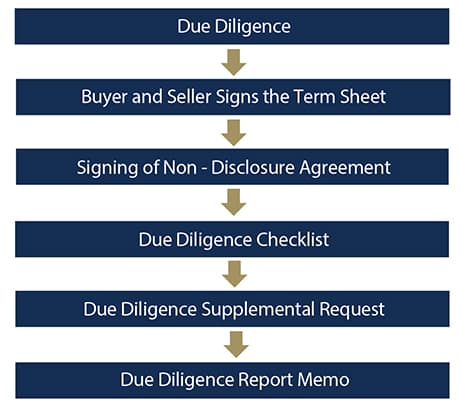Due Diligence by Foreign Law Firms of UAE Entities
 Business transactions around the world often involve mergers, acquisitions or take-overs. Such transactions of the business organizations require thoughtful decisions which ultimately decides the future of the Company. Hence, due diligence holds the key to vital decisions of the economy as to whether the deal should be given a green flag or not.
Business transactions around the world often involve mergers, acquisitions or take-overs. Such transactions of the business organizations require thoughtful decisions which ultimately decides the future of the Company. Hence, due diligence holds the key to vital decisions of the economy as to whether the deal should be given a green flag or not.
UAE as an economic and commercial hub in the Middle East and North Africa (MENA) region, has numerous foreign and domestic investors who are attracted towards the region’s incentives like the tax regimes, free zones, etc. operating in the region. While some establish their own ventures, some businesses opt to enjoy the market reputation of the existing operations and employee base of established corporates in the UAE via mergers or acquisitions. Due diligence investigation is a useful tool to analyze the potential benefits and risks of investments. But easier said than done, the legal due diligence of a company is often a tedious task, which can significantly decide the timeline of the transactions.
 In plain terms, legal due diligence is a process through which substantial and reliable information about a business entity to discover any facts, circumstances or legal risks that are likely to influence a business decision. A snapshot of due diligence is depicted below:
In plain terms, legal due diligence is a process through which substantial and reliable information about a business entity to discover any facts, circumstances or legal risks that are likely to influence a business decision. A snapshot of due diligence is depicted below:
Although due diligence is not mandated by UAE law, it is always recommended to the buying entity that extensive due diligence for actual or constructive liabilities of target entity should be done. Also, legal and regulatory approvals and restrictions on transaction become clear to the purchaser.
The information of the target company that is of the essence for the purchaser company is presented as follows:
- Corporate Information
- Legal entity structure, including name, location and function of all divisions, subsidiaries or related entities
- Memorandum of Association & Articles of Association (or Constitutive Contract), including all amendments
- Minutes of all meetings and consent in writing of managers, the board of directors, board committees and other committees and shareholders.
- Shareholder/Partner (Owner) Information
- Lists of all existing owners of shares with their address, number of shares they own, dates of issuance of shares and full payment, the consideration received by the Company.
- List of all options and other rights to acquire equity securities.
- Material Contracts
- Debt financings
- Bank line of credit or loan agreements and guarantees
- Standard sales or license agreements
- Indemnification agreements
- Products, Manufacturing & Competition
- Copies of any non-competition agreements of the Company with employees and subsidiaries
- List of the top customers of the Company, indicating the products and the amounts of each purchase.
- List of service and support contracts
- Forms of warranties and guarantees provided to customers
- Litigation & Audits
- All management letters or individual reports from the auditor and responses to internal accounting controls.
- Settlement documents
- Decrees, order and judgments of courts or governmental agencies concerning the Company
- Employees & Management
- Management and organization of the company
- Personnel handbooks and manuals
- Government Contracts
- Tenders and Government contracts and assignments
- Technology and Proprietary Rights
- All patents and applications pending or held by the Company
- Copies of the agreement pertaining to confidentiality, non-disclosure, and assignment of invention agreements, between the Company and employees.
- List of all copyright and trademark registrations and applications of all intellectual property
- General
- Report on all actual or potential conflicts of interests that the Company’s directors, officers or employees have due to their relationship with any other person or entity which has any interest, financial or otherwise, in the Company
- List and description of all transactions between the Company and its employees, directors or shareholders.
Any other documents which are relevant to the company and the sector in which it is operating as the due diligence and the perusal of documents differs from one domain of operation to another domain. But the above gives a bird’s view of the same.
 The basic aim of drafting observations and action points in a due diligence report is to bring out or raise red flag over a gap of information or at the time of a non-compliance or an additional consent etc. required from the third party which was not known till the time it was raised in the due diligence report. Now, when it comes to the drafting of the observations and action points, lawyers need to keep one thing in mind that the due diligence report which is being prepared before a transaction would be discussed amongst or may be referred to a certain class of people who may not be lawyers. They could be read by business people, CEOs, CFOs or board of the company, general counsels, investor’s legal advisors, investment managers, etc. Therefore, the correct and the most favoured way of drafting is first to tell the reader what has been provided for review, then your observations and lastly, the consequence of the observation (for, example, if it is a non-compliance, then the consequence of it, such as a penalty, etc.) so that even a non-lawyer could understand the basic requirement of such an observation.
The basic aim of drafting observations and action points in a due diligence report is to bring out or raise red flag over a gap of information or at the time of a non-compliance or an additional consent etc. required from the third party which was not known till the time it was raised in the due diligence report. Now, when it comes to the drafting of the observations and action points, lawyers need to keep one thing in mind that the due diligence report which is being prepared before a transaction would be discussed amongst or may be referred to a certain class of people who may not be lawyers. They could be read by business people, CEOs, CFOs or board of the company, general counsels, investor’s legal advisors, investment managers, etc. Therefore, the correct and the most favoured way of drafting is first to tell the reader what has been provided for review, then your observations and lastly, the consequence of the observation (for, example, if it is a non-compliance, then the consequence of it, such as a penalty, etc.) so that even a non-lawyer could understand the basic requirement of such an observation.
Action points are stated in the report but at an interim stage for the purpose of internal communication so that the target or investee company representatives can rectify the anomalies. They are often removed in the final report. The due diligence report generally has the following points in it to make a credible document: -
|
PROJECT NAME |
|
SUMMARY OF CONTENTS: |
|
Transfer of Control • Key Commercial Terms • Duration of Material Contracts, Penalties, IPRs, etc. • Assignment • Termination • Governing Law/Jurisdiction |
- KYC Details and Background Check
It involves identifying the entity such as incorporation certificate, commercial license, shareholders, key directors and media releases.
- Dubai Chamber of Commerce and Industry
The credit ratings and recommended credit limits of the company, besides companies’ and financial information, such as shareholders, directors, bankers, payment history, etc.
- Department of Economic Development (DED) database
It provides trade license number of the company, status of activity, expiry date, its activities, and the contact information and location of the company.
- Al Etihad Credit Bureau (AECB)
It is a federal company [AA1] which is mainly a public joint-stock company (PJSC) which is wholly owned by the Federal Government of UAE. As per the Federal Law No. 6 of 2010 of UAE pertaining to the credit information, AECB is mandated to recurrently gather credit information from UAE’s financial and non-financial institutions. It keeps details from all UAE banks, financial institutions and individuals and it provides credit reports for a nominal fee providing details of the debt levels and financial creditworthiness of UAE entities.
Either the individual himself or by executing the power of attorney to the lawyer, an entity can check the credit information from the above-listed sources.
 Though the process and report of due diligence seem to be an exhaustive and in-depth one but the gross limitation of the process is that it is limited to two to five years during the examination. Moreover, legal due diligence doesn’t reflect the financial and other due diligence, which is an expert domain of investment or merchant bankers or private equity firm.
Though the process and report of due diligence seem to be an exhaustive and in-depth one but the gross limitation of the process is that it is limited to two to five years during the examination. Moreover, legal due diligence doesn’t reflect the financial and other due diligence, which is an expert domain of investment or merchant bankers or private equity firm.
As Dubai envisions itself to be a smart city and with Expo 2020 UAE plans to be the hub of financial and commercial locus of the world, due diligence as a requirement would definitely pick the ground.
 English
English
 عربي
عربي Русский
Русский 官话
官话 português
português
 Türk
Türk 
















